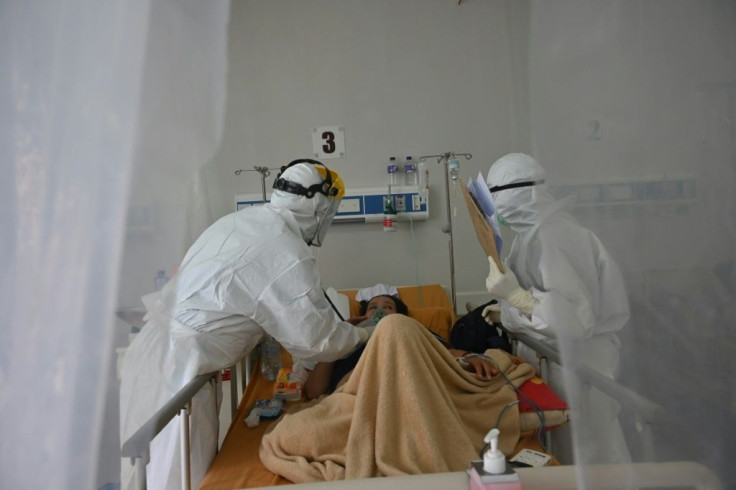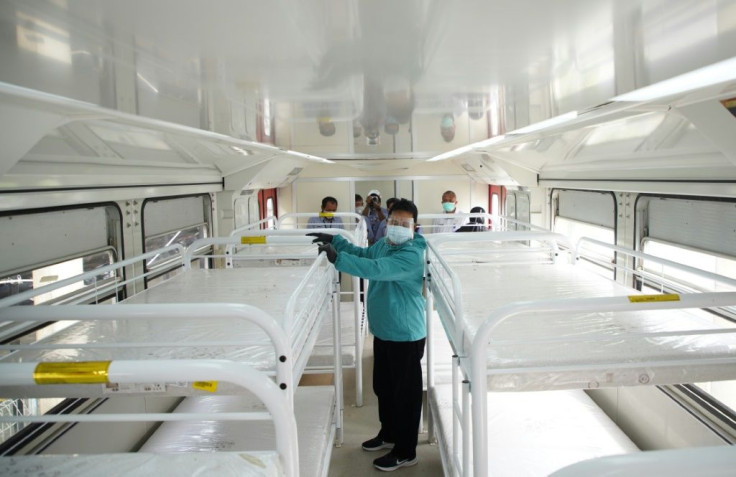Indonesia Passes One Million Coronavirus Cases
Indonesia's Covid-19 cases topped the one million mark on Tuesday, as the archipelago launches one of the world's biggest vaccine drives to clamp down on a soaring infection rate.
The Southeast Asian nation of nearly 270 million has recorded 1,012,350 virus cases and almost 29,000 deaths, according to official data. But low testing rates mean the crisis is believed to be much more severe than those figures suggest.
Some hospitals are on the brink of collapse as they are overwhelmed with patients in one of Asia's worst-hit nations, health experts warn.
"I think we hit one million cases of Covid-19 a long time ago," said Pandu Riono, a University of Indonesia epidemiologist.
"We are still climbing a mountain and we don't even know where the peak is. This is a never-ending climb."
There are reports of patients being unable to access intensive care units and isolation rooms due to high demand -- a shortage underscored by an East Java city's move to outfit a train carriage to accommodate the sick.

The virus has killed more than 600 doctors, nurses and other medical workers, many outfitted with limited protection equipment, according to independent researchers.
"Hospitals are already collapsing," Riono said, adding that the government had "no management, no plan, no priorities, just trial and error".
Indonesia's government has been widely criticised for initially downplaying the pandemic and, later, for lacking a coherent strategy to deal with the deadly respiratory illness, which has killed more than two million globally.
Reacting to Tuesday's grim milestone, health minister Budi Gunadi Sadikin said the country was "grieving" those who died.
The one million figure shows we "need to keep working harder and harder so we don't waste the sacrifices made by our fellow health workers", he said.

The World Health Organization has pointed to a "wide gap between the number of people tested and suspected cases" in Indonesia.
"Improving testing capacity is therefore imperative," it added in a report last week.
Jakarta has reimposed movement restrictions as cases spiked in the mega-city capital.
But health protocol breaches are widespread nationwide, including on holiday island Bali where police are forcing some violators to do push-ups as punishment for not wearing a mask.
"Our discipline remains low," said Laura Navika Yamani, an epidemiologist at Airlangga University.
"For a country with a big population like ours, it's not easy to practice health protocols, especially physical distancing."
The country of some 17,000 islands is now rolling out a huge vaccination drive with front-line workers and other high-risk groups among the first to get the jab, produced by China's Sinovac.
Officials had earlier said they would focus on inoculating the 18-59 year old working population instead of prioritising the elderly, like many countries are doing.
But the health ministry later said some 25 million seniors would be targeted after doctors and other front-line workers if testing shows the Sinovac jab is safe for older people.
This month, Indonesian President Joko Widodo received the country's first Covid-19 jab on live television along with his health minister, several senior officials, as well as business and religious leaders.
Muslim-majority Indonesia's top religious body also approved the vaccine as halal -- meaning permissible under Islam -- in a move that could help convince wary citizens.
Previous vaccination drives have been met with resistance by some segments of the country's huge population, the world's fourth-largest.
Indonesia is aiming to inoculate nearly 182 million people over the next 15 months.
The country has signed deals for about 330 million vaccine doses from a string of pharmaceutical companies including AstraZeneca, Pfizer and Chinese suppliers.
© Copyright AFP 2024. All rights reserved.





















